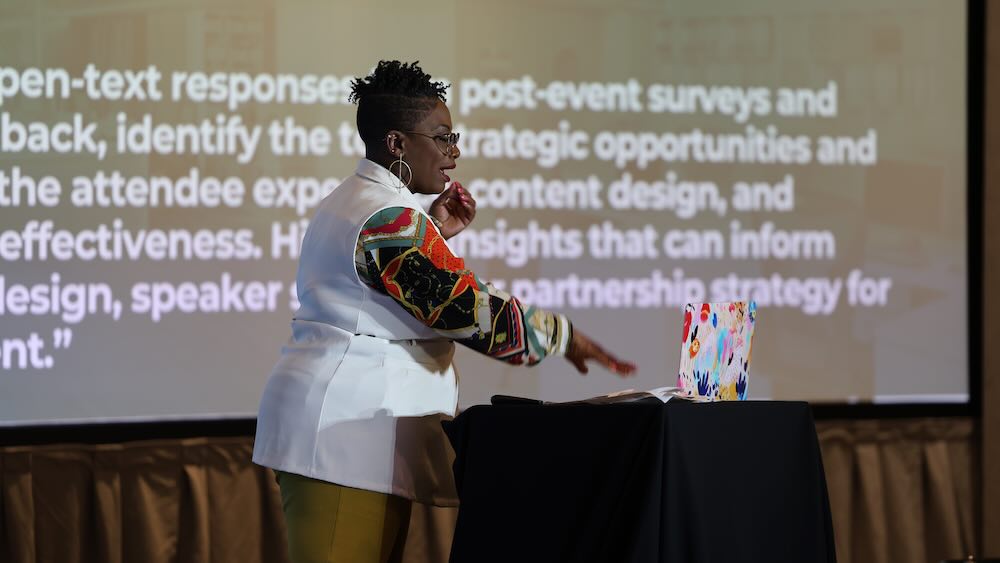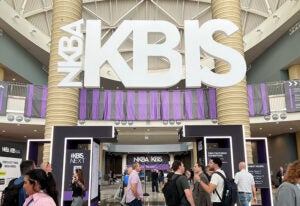


Castleberry shared her AI expertise at edUcon. Photo by Jacob Slaton / Whatever Media Group
Princess Castleberry, the CEO of Castleberry Global, a speaking and leadership training company, describes herself as a tech enthusiast rather than a technologist. “I’m an early adopter,” Castleberry said. “I’ve always been very tech curious.”
So when OpenAI introduced ChatGPT in late 2022 and one of Castleberry’s former college professors, a physicist, reached out to her and asked her to try it out with him, she said yes. Together they went into the generative AI platform and devised a prompt that allowed Castleberry to compare Black female poet laureates with one another. “What it produced,” Castleberry said, “was so deep and so accurate and so insightful,” that her professor said, “‘Yeah, whatever this thing is, the whole world just changed.’”
But what propelled Castleberry toward finding ways to share what she was learning about generative AI was the initial lack of reaction to ChatGPT she encountered in the small-business community in Detroit where she was born and where her company is based. When she asked other female entrepreneurs what they thought about the technology, “I got nothing but blank stares,” she said. As someone whose background includes working for decades in corporations in risk management, bells went off, she said. “This is technology that is as important as the advent of the internet itself, and as important as the proliferation of email and social media. And here we are, a community of small-business owners and y’all don’t know nothing about it,” she said. “I was very deeply concerned.”
Exercising Discipline
Castleberry, who has a master’s degree in instructional design, developed a two-part workshop for clients, “The Future of AI is Now: Parts I and II.” Part I introduces audiences to the history of AI-based tools, including where they come from and how they’re structured, and Part II addresses how AI tools can fit into and benefit people’s real lives and careers. She also began researching how to put a tech stack together — a term she borrowed from her tech clients to refer to the collection of digital tools that you use to accomplish multiple tasks.
In the leadership model that she uses in her coaching and speaking business, she emphasizes the need to be disciplined while implementing technology — choosing tools and platforms that reduce noise and enhance productivity, and human connection. “AI can be very overwhelming — it can go from being this helpful thing to making you feel stupid,” Castleberry said. “You’ll get swallowed up if you try to keep up with all of the tools.”
Castleberry encountered Spark last January as a first-time attendee at Convening Leaders, when she attended a Spark Lab. At the time, she was planning a spring women’s event in Detroit and began, she said, to use the platform right away. Spark exemplifies her concept of a focused approach to tech tools, she said. “It’s a bit of a hybrid with much of the same functionality as ChatGPT, where you can write custom prompts,” and it also “has a sort of guardrail around it in that it’s a large language model, but it was created for and by event professionals,” she said. “So the knowledge that it has access to, in addition to the internet, is very tailored to this industry. Instead of giving you loads and loads of information, it’s a little bit more contained.”
Recently, Castleberry has added completion of PCMA’s five-part Spark certificate course to her credentials and has begun sharing her insights and expertise in using AI tools including Spark as a speaker and educator. Her session, “From Gut Feelings to Game-Changing Insights: Turning Feedback into Action with AI,” which she presented at PCMA’s edUcon in June and at PCMA’s CEMA Summit in July, walks event professionals through how to use AI tools to analyze feedback and other data collected at events.
“The events profession can be brutal,” Castleberry said. “It’s a lot of work, a lot of coordination, and there are lots of moving pieces.” Just trying to build an agenda — “how many times does that agenda change based on speaker availability?” she asked. Not to mention, “trying to do an analysis of last year’s conference to see what people loved and what people didn’t love before you begin to build a simple agenda.”
With Spark, the process is not only “accelerated, but it’s far more insightful — you’re not just throwing an agenda together based off hunches but using insights from your data,” she said. And then, “Spark gives you all these different ideas to market it.” If you have video from a previous event, “you can just upload links and Spark will repurpose them.”
Using Spark to conduct a recent cost analysis of a half-day workshop that Castleberry and a partner present was one of the best things she’s done with the platform to date, she said. Instead of starting with the registration amount that they charged in the past, Castleberry asked Spark to set one, after loading information about the workshop and persona information about her target audience. “Spark came up with a price point that was three times more than what I was charging — and gave me a full justification for it,” she said. “When I told [Spark] how much I was charging, it basically told me, ‘No, no, no, no, you’re way under market.’” The platform also presented Castleberry with information about the risks of raising the price — the higher price could cause her to lose much of the past audience for the workshop. But, Spark added, she should probably be targeting a different audience.
“That,” Castleberry said, “is powerful.”
Legally Speaking
When Castleberry encountered Spark, “the fact that it had a legal component was very exciting to me — you want to make sure your technology isn’t going to create more liability for you,” she said. In her experience, Spark puts users in the position where they are making sounder decisions about legal questions. “It’s not giving [legal] advice, but it’s giving you recommendations on what you can do to protect yourself, recommendations on how to structure language, what clauses to include, and other things to consider.”
What’s in Your AI Tech Stack?
Spark is a great primary platform for event professionals, said Castleberry. “But I would be lying,” she added, “if I said that I found a platform that was a cure-all.”
When we asked Castleberry to design an ideal tech stack for event professionals, she included
the following:
- Content Generation: Spark, ChatGPT, Bizzabo event management software, and Lavender, a sales-focused email service
- Feedback and Insights: Spark, Typeform online form builder, and ChatGPT
- Operations and Planning Support: Spark, Bizzabo, and ChatGPT
- Legal Analysis: Spark, Ironclad contract management, and Harvey, a legal and professional services provider
- Live and Video Transcription: Wordly, Fireflies, and Otter AI notetakers
- Post-Event Marketing and Content Repurposing: Spark, OpusClip, and Descript
- Venue Sourcing: Destinaitor
Barbara Palmer is deputy editor at Convene.
On the Web
- Learn more about Princess Castleberry at princesscastleberry.com.
- Learn about Spark, the AI tool developed for event professionals by PCMA and Gevme, at pcma.org/spark.








